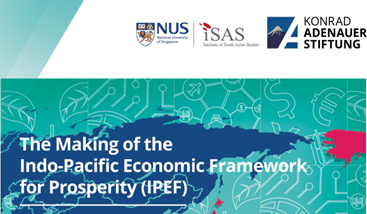The EU, the Indo-Pacific and the US-led IPEF: Which Way Forward?

The paper provides a European Union (EU) perspective on the Indo-Pacific Economic Framework (IPEF).
First, the recent progress made by the IPEF has given new momentum to the EU’s engagement with the Indo-Pacific (IP) partners and to its recently launched Indo-Pacific strategy.
In terms of substance, two issues appear to be at the forefront of the IPEF as well as of the EU’s Indo-Pacific strategy, namely supply chain resilience enhancement and various aspects of the digital economy.
There is probably scope for convergence and cooperation between the EU and the IPEF countries on the former issue, which is addressed indirectly in different EU’s digital partnerships, while it is the area where the IPEF has made most substantial progress.
However, the differences between the EU’s and the United States’ (US) approaches to some aspects of the digital economy may act as stumbling blocks and give rise potentially to some form of competition in the IP region, making cooperation on data-based efforts to enhance supply-chain resilience rather complicated.
> Read the whole chapter on the website of the Konrad Adenauer Shiftung.

Available in:
Regions and themes
Share
Related centers and programs
Discover our other research centers and programsFind out more
Discover all our analyses
RAMSES 2024. A World to Be Remade
For its 42nd edition, RAMSES 2024 identifies three major challenges for 2024.
France and the Philippines should anchor their maritime partnership
With shared interests in promoting international law and sustainable development, France and the Philippines should strengthen their maritime cooperation in the Indo-Pacific. Through bilateral agreements, expanded joint exercises and the exchange of best practices, both nations can enhance maritime domain awareness, counter security threats and develop blue economy initiatives. This deeper collaboration would reinforce stability and environmental stewardship across the region.

The China-led AIIB, a geopolitical tool?
The establishment of the Asian Infrastructure Investment Bank (AIIB) in 2016, on a Chinese initiative, constituted an attempt to bridge the gap in infrastructure financing in Asia. However, it was also perceived in the West as a potential vehicle for China’s geostrategic agendas, fueling the suspicion that the institution might compete rather than align with existing multilateral development banks (MDBs) and impose its own standards.
Jammu and Kashmir in the Aftermath of August 2019
The abrogation of Article 370, which granted special status to the state of Jammu and Kashmir (J&K), has been on the agenda of the Bharatiya Janata Party (BJP) for many decades.







